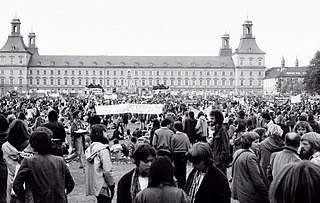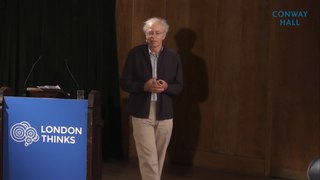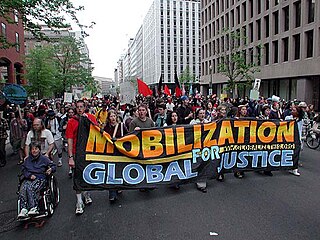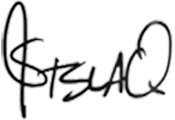 W
WA social movement is a loosely organized effort by a large group of people to achieve a particular goal, typically a social or political one. This may be to carry out, resist or undo a social change. It is a type of group action and may involve individuals, organizations or both. Definitions of the term are slightly varied. Social movements have been described as "organizational structures and strategies that may empower oppressed populations to mount effective challenges and resist the more powerful and advantaged elites". They represent a method of social change from the bottom within nations.
 W
WThe anti-nuclear movement is a social movement that opposes various nuclear technologies. Some direct action groups, environmental movements, and professional organisations have identified themselves with the movement at the local, national, or international level. Major anti-nuclear groups include Campaign for Nuclear Disarmament, Friends of the Earth, Greenpeace, International Physicians for the Prevention of Nuclear War, Peace Action and the Nuclear Information and Resource Service. The initial objective of the movement was nuclear disarmament, though since the late 1960s opposition has included the use of nuclear power. Many anti-nuclear groups oppose both nuclear power and nuclear weapons. The formation of green parties in the 1970s and 1980s was often a direct result of anti-nuclear politics.
 W
WThe Black Catholic Movement or Black Catholic Revolution was a movement of African-American Roman Catholics which developed and shaped modern Black Catholicism.
 W
WThe expression collective behavior was first used by Franklin Henry Giddings (1908) and employed later by Robert E. Park and Burgess (1921), Herbert Blumer (1939), Ralph H. Turner and Lewis Killian (1957), and Neil Smelser (1962) to refer to social processes and events which do not reflect existing social structure, but which emerge in a "spontaneous" way. Use of the term has been expanded to include reference to cells, social animals like birds and fish, and insects including ants. Collective behavior takes many forms but generally violates societal norms. Collective behavior can be tremendously destructive, as with riots or mob violence, silly, as with fads, or anywhere in between. Collective behavior is always driven by group dynamics, encouraging people to engage in acts they might consider unthinkable under typical social circumstances.
 W
WThe country life movement was an early 20th century American social movement which sought to improve the living conditions of America's rural residents. The movement focused on preserving traditional rural lifestyles while addressing poor living conditions and social problems within rural communities. Despite the movement's rural focus, many of its adherents were urbanites who sought to bring progressive changes and technological improvements to rural areas. The movement had little success in changing rural ways of life; its principal successes were the promotion of agricultural extension programs and the development of national organizations to improve rural living.
 W
WThe Cry of the Excluded is a number of popular demonstrations in Brazil held every year during the week of September 7, the Brazilian Independence Day, to ask for attention for the people that are excluded of all what makes life worth as a human being.
 W
WDiversity of tactics is a phenomenon wherein a social movement makes periodic use of force for disruptive or defensive purposes, stepping beyond the limits of nonviolence, but also stopping short of total militarization. It also refers to the theory which asserts this to be the most effective strategy of civil disobedience for social change. Diversity of tactics may promote nonviolent tactics, or armed resistance, or a range of methods in between, depending on the level of repression the political movement is facing. It sometimes claims to advocate for "forms of resistance that maximize respect for life".
 W
WEffective altruism is a philosophy and social movement that advocates using evidence and reasoning to determine the most effective ways to benefit others. Altruism refers to improving the lives of others—as opposed to egoism, which emphasizes only self-interest. Effectiveness refers to doing the most good with whatever resources are available—as opposed to only doing some amount of good—as well as determining what is the most good by using evidence and reasoning—as opposed to only doing what feels good or appears intuitively appealing.
 W
WFair trade is an arrangement designed to help producers in growing countries achieve sustainable and equitable trade relationships. Members of the fair trade movement add the payment of higher prices to exporters, as well as improved social and environmental standards. The movement focuses in particular on commodities, or products that are typically exported from developing countries to developed countries, but is also used in domestic markets, most notably for handicrafts, coffee, cocoa, wine, sugar, fruit, flowers, and gold. The movement seeks to promote greater equity in international trading partnerships through dialogue, transparency, and respect. It promotes sustainable development by offering better trading conditions to, and securing the rights of, marginalized producers and workers in developing countries. Fair trade is grounded in three core beliefs; first, producers have the power to express unity with consumers. Secondly, the world trade practices that currently exist promote the unequal distribution of wealth between nations. Lastly, buying products from producers in developing countries at a fair price is a more efficient way of promoting sustainable development than traditional charity and aid.
 W
WThe feminist movement refers to a series of political campaigns for reforms on issues such as reproductive rights, domestic violence, maternity leave, equal pay, women's suffrage, sexual harassment, and sexual violence. The movement's priorities vary among nations and communities, and range from opposition to female genital mutilation in one country, to opposition to the glass ceiling in another.
 W
WThe free-culture movement is a social movement that promotes the freedom to distribute and modify the creative works of others in the form of free content or open content without compensation to, or the consent of, the work's original creators, by using the Internet and other forms of media.
 W
WThe Free Hugs Campaign is a social movement involving individuals who offer hugs to strangers in public places. The hugs are meant to be random acts of kindness—selfless acts performed just to make others feel better. International Free Hugs Month is celebrated on the first Saturday of July and continues until August first.
 W
WThe global justice movement is a network of globalized social movements demanding global justice by opposing what is often known as the “corporate globalization” and promoting equal distribution of economic resources.
 W
WLion Versus or Lion Against is a Russian youth social movement opposed to smoking and drinking alcohol in public. Lion Versus volunteers hold video-recorded "raids" by visiting public areas such as train stations, parks and public squares, and asking people to stop smoking in designated non-smoking areas. If the smokers refuse, Lion Versus activists spray the smokers' hands with water from spray bottles in order to extinguish their cigarettes. In anti-public-intoxication raids, activists patrol public parks and squares, asking people who are drinking alcohol to pour the alcoholic beverages out in a nearby trash can or drain. If the people approached state the alcohol is not theirs, Lion Versus activists pour it out themselves. Police officers sometimes accompany Lion Versus activists on their raids, writing tickets to offenders. Videos of the raids are posted on Lion Versus's YouTube channel, publicly shaming smokers and drinkers while gathering online support as well as advertising revenue and donations. As of January 2019, the channel has over 1.5 million subscribers.
 W
WThe March for Science is an international series of rallies and marches held on Earth Day. The inaugural march was held on April 22, 2017, in Washington, D.C., and more than 600 other cities across the world. According to organizers, the march is a non-partisan movement to celebrate science and the role it plays in everyday lives. The goals of the marches and rallies were to emphasize that science upholds the common good and to call for evidence-based policy in the public's best interest. The March for Science organizers, using crowd science techniques, estimated global attendance at 1.07 million, with 100,000 participants estimated for the main March in Washington, D.C., 70,000 in Boston, 60,000 in Chicago, 50,000 in Los Angeles, 50,000 in San Francisco, 20,000 in Seattle, 14,000 in Phoenix, and 11,000 in Berlin.
 W
WOpen access (OA) is a set of principles and a range of practices through which research outputs are distributed online, free of cost or other access barriers. With open access strictly defined, or libre open access, barriers to copying or reuse are also reduced or removed by applying an open license for copyright.
 W
WA political movement is a collective attempt by a group of people to change government policy or social values. Political movements are usually in opposition to an element of the status quo and are often associated with a certain ideology. Some theories of political movements are the political opportunity theory which states that political movements stem from mere circumstances and the resource mobilization theory which states that political movements result from strategic organization and relevant resources. Political movements are also related to political parties in the sense that they both aim to make an impact on the government and that several political parties have emerged from initial political movements. While political parties are engaged with a multitude of issues, political movements tend to focus on only one major issue.
 W
WRepertoire of contention refers, in social movement theory, to the set of various protest-related tools and actions available to a movement or related organization in a given time frame.
 W
WResource mobilization is the process of getting resources from the resource provider, using different mechanisms, to implement an organization's predetermined goals. It is a theory that is used in the study of social movements and argues that the success of social movements depends on resources and the ability to use them.
 W
WIn 1956, Anthony F. C. Wallace published a paper called "Revitalization Movements" to describe how cultures change themselves. A revitalization movement is a "deliberate, organized, conscious effort by members of a society to construct a more satisfying culture" (p. 265), and Wallace describes at length the processes by which a revitalization movement takes place.
 W
WSocial change involves alteration of the social order of a society. It may include changes in social institutions, social behaviours or social relations.
 W
WStudent activism or campus activism is work by students to cause political, environmental, economic, or social change. Although often focused on schools, curriculum, and educational funding, student groups have influenced greater political events.
 W
WSyndicalism is a current in the labor movement to establish local, worker-based organizations and advance the demands and rights of workers through strikes. Most active in the early 20th century, syndicalism was predominant in the revolutionary left in the decade which preceded the outbreak of World War I because orthodox Marxism was mostly reformist at that time, according to the Marxist historian Eric Hobsbawm.
 W
WThe temperance movement is a social movement against the consumption of alcoholic beverages. Participants in the movement typically criticize alcohol intoxication or promote complete abstinence from alcohol (teetotalism), and its leaders emphasize alcohol's negative effects on people's health, personalities and family lives. Typically the movement promotes alcohol education and it also demands the passage of new laws against the sale of alcohol, either regulations on the availability of alcohol, or the complete prohibition of it. During the 19th and early 20th centuries, the temperance movement became prominent in many countries, particularly in English-speaking and Scandinavian ones, and it eventually led to national prohibitions in Canada, in Norway and in the United States, as well as provincial prohibition in India. A number of temperance organizations exist that promote temperance and teetotalism as a virtue.
 W
WTSLAQ is a loose, international collective of largely anonymous short-sellers, skeptics, and researchers who openly criticize Tesla, Inc. and its CEO, Elon Musk. The group primarily organizes on Twitter, often using the $TSLAQ cashtag, and Reddit to coordinate efforts and share news, opinions, and analysis about the company and its stock. Edward Niedermeyer, in his book Ludicrous: The Unvarnished Story of Tesla Motors (2019), establishes the catalyst for the formation of TSLAQ in July 2018 to be the doxxing by a Twitter user of Lawrence Fossi, a Seeking Alpha writer and Tesla short seller who uses the pseudonym Montana Skeptic.
 W
WValue-added theory is a sociological theory that was first proposed by Neil Smelser in 1962 based on the assumption that certain conditions are needed for the development of a social movement. Smelser saw social movements as side-effects of rapid social change.
 W
WLa Vía Campesina is an international farmers organization founded in 1993 in Mons, Belgium, formed by 182 organisations in 81 countries, and describing itself as "an international movement which coordinates peasant organizations of small and middle-scale producers, agricultural workers, rural women, and indigenous communities from Asia, Africa, America, and Europe".
 W
WThe Wikimedia movement, or simply Wikimedia, is the global community of contributors to Wikimedia Foundation projects. The movement was created around Wikipedia's community, and has since expanded to the other Wikimedia projects, including the commons projects Wikimedia Commons and Wikidata, and volunteer software engineers and developers contributing to MediaWiki. These volunteers are supported by numerous organizations around the world, including the Wikimedia Foundation, related chapters, thematic organizations, and user groups.